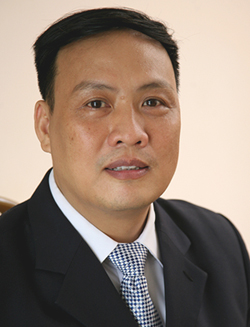

Prof. Dr. Nguyen Dinh Duc - Head of Training Department, Vietnam National University, Hanoi
Foreign language is just a prerequisite subject.
- The new regulations on undergraduate and postgraduate training of VNU (Regulations) that have just been issued were compiled on the basis of which legal documents and based on what specific criteria of VNU, Professor?
The basis for developing this university and postgraduate training regulation is: Decree 186/2013/ND-CP of the Government on National Universities; Regulation 26/2014/QD-TTg on organization and operation of National Universities; Circular 15/2014/TT-BGDDT of the Ministry of Education and Training promulgating the regulation on master's level training.
The new regulations aim to adjust training activities and training management to be more suitable with the development practice of VNU, in the direction of strengthening VNU's authorization to units in training activities; enhancing the responsibility of lecturers and learners; promoting the responsibility of inspection and supervision of training management departments and most importantly, creating a legal foundation to continue affirming VNU's pioneering position in developing new training majors and disciplines, new training models, in the direction of improving quality, integrating and meeting international standards.
- Can you tell us about the new highlights in this university training regulation?
There are some notable new points as follows:
The firstis a change in some concepts. For example, in the old regulations, university subjects were called subjects. Postgraduate subjects were called credits. Now, university and postgraduate subjects are unified in the name.courseSoft skills courses are calledAdditional Skills… These names are more accurate and scientific, suitable for credit training method.
MondayForeign language is only a conditional subject. If according to the old Regulations, the score of the foreign language subject is calculated into the cumulative average score of the whole semester and the whole learning process, now, according to the new Regulations, foreign language will only be a conditional subject, only counted as passing or failing, and the number of foreign language credits will not be counted into the total number of credits that must be accumulated to calculate the overall average score.
The training of specialized foreign languages (if included in the training program) and subjects in the group of supplementary skills is now assigned to training units to research, select content and organize training suitable to the needs, characteristics and reality of their units.
Tuesdayare changes in the registration for improvement of scores. The previous regulations allowed students to retake the exam to improve their scores, to take the exam scores from the most recent improvement exam, and thus students could retake the exam to achieve better academic performance. The new regulations only allow students with scores of D, D+ (below average) to take the exam to improve their scores. Thus, students should grasp this change to be more serious and conscious in investing in their studies right from the first years.
Wednesday,Students are only allowed to register for no more than 18 credits in a semester. Previously, the old regulations did not stipulate this, so students registered for too many credits in a semester without control, which easily affected the quality of their studies. Therefore, the new regulations also require students to consider carefully and have a sense of responsibility when registering for a double major.
Thursday, students can register to study for a second degree (formerly called a double degree) from semester 3 (second year) if their semester GPA is 2.0 or higher (previously the regulation was 2.5). This is an adjustment in line with reality, towards creating more favorable conditions for students to study two majors at the same time.
However, students will have to stop studying the second major if their academic results are poor in one of the two majors. The training unit must update the student's grades in both majors after each semester. This is regulated more clearly and strictly than before, so students also need to carefully consider their learning goals.
Friday, on screening and conversion between standard training programs and high-quality, talented, international standard programs: more specific regulations on scores and requirements to convert and screen students studying in these programs.
Saturday, the regulations on transferring from other universities to VNU are also clearer and stricter: students from other universities who want to transfer to study at VNU training facilities must not be first-year students or final-year students, have an average academic result of 2.5 or higher and pass the competency assessment exam organized by the training unit of VNU.

First time high quality training at Master level
- So, for postgraduate training, what are the new points in the Regulations, Professor?
A particularly noteworthy new point in the master's training regulations is that VNU will, for the first time, provide high-quality master's training. This stems from the practice of VNU, since 1997, VNU has pioneered in training talented science bachelors and then high-quality university graduates. This model has since been replicated throughout the industry (in 2014, the Ministry of Education and Training issued a circular on high-quality university training). Now is the right time for VNU to pioneer high-quality master's training.
Converting the recognition of pre-accumulated credits for postgraduate level is also a new point. Students of the talented, high-quality, international standard training program of Hanoi National University, who have studied at least 4 semesters, can register to accumulate some credits in advance of the master's training program in the correct or appropriate major if they meet the prescribed conditions (must have written consent from the head of the training unit where the student is studying; cumulative average score of 2.5 or higher; master's training units organize for students who are eligible to accumulate credits in advance to participate in concentrated study with the class of students and in one semester, CLC, TN, QT standard students can only register to study a maximum of 3 credits of the master's training program). This encourages students of the talented, high-quality, international standard programs to have a clear orientation in choosing to continue studying at the postgraduate level at Hanoi National University right from when they are still students.
With the new regulations, the structure of master's training programs will have to be built and supplemented. The new regulations stipulate 45 credits for a one-and-a-half-year training program (application-oriented) and 60 credits for a two-year training program (research-oriented). This is a very important task, VNU has issued instructions and requires postgraduate training units to focus their efforts on completing it in 2015 before opening new postgraduate courses.
The new regulation also allows training units to choose one of the university entrance exams that can be replaced by a competency assessment test.
The new regulations allow exemption from foreign language entrance if master's candidates have appropriate foreign language certificates or diplomas, meeting the criteria specifically specified in the Regulations.
As with undergraduate level, at master level, basic foreign language is only a conditional subject in the training program and when considering graduation, students need to have proof of meeting the output foreign language standards of the training program. Specialized foreign language subjects (if any in the postgraduate training program) are organized and implemented by the training institution.
Regarding the regulations on correct majors, related majors and other majors, there are new changes, that is, the university graduation major is determined to be the correct major, the major suitable for the major, the major participating in the master's training exam when the training programs of these two majors at the university level differ by less than 10% in both content and study time of the major's knowledge block. The university graduation major is determined to be the major close to the major, the major participating in the master's training exam when the training programs of these two majors at the university level differ by 10% to 40% in both content and study time of the major's knowledge block (total number of study hours or credits or credits of the major's knowledge block). The university graduation major is determined to be a major different from the major, the major participating in the master's training exam when they are not in the same group of majors or the two university training programs differ by more than 40% in both content and study time. Thus, this new ratio has been adjusted in a more stringent direction.
In addition, the new Regulations have some stricter regulations such as: no change of training major during the master's study process; lecturers must grade the modules within a maximum of 15 working days; to defend the master's thesis, the student's cumulative GPA is only required to be 2.0 or higher (instead of 2.5 as in the previous Regulations); the thesis grading score is only a maximum of 9 points, with a maximum of 1 point added for theses in which the student has had a related scientific article published in the list of specialized scientific journals prescribed by the head of the training unit or has application results that have been approved in writing by the place of application regarding the transfer and implementation of research results; The new Regulations also clearly stipulate the form of handling and discipline if plagiarism occurs during the master's thesis writing process. Thus, it can be seen that the new regulations in training management activities are stricter and more specific. Postgraduate students are required to participate more actively in research activities and must have a high sense of responsibility for the research results in their theses.
- How will this regulation be applied in the coming time? What should training units pay attention to during the implementation process, Professor?
This regulation applies to courses enrolling from 2015 onwards. Contents related to the thesis evaluation process, recognition of degrees and granting of master's degrees are applied immediately to graduate students defending their theses after January 1, 2015.
The two regulations have many new points. Training units need to promptly and fully disseminate the two new training regulations to staff, lecturers, students and postgraduates; organize training for staff involved in the training management process at the school, faculty and department levels and staff working in inspection, examination and supervision of training activities at the units.
Author:Thanh Ha
Newer news
Older news